Danum river in Sabah, Malaysia. Photo by Rhett A. Butler 2008.
Rights groups have condemned the destruction of more than two dozen homes in the indigenous Iban community of Sungai Sekabai, in the Malaysian state of Sarawak. Malaysian authorities are said to be preparing to level the rest of the village soon.
The demolition of the homes is a dramatic escalation of a dispute between the Iban and a timber company, which has claimed lands customarily used by the Iban. The company has cleared much of the forest around the community, replacing it with acacia plantations (visible in the pictures below). The logging has occurred despite a 2001 court ruling acknowledged that the Iban community had native customary rights over both their farmland and surrounding primary rainforests.
The Sarawak state government has long backed industrial interests over those of native peoples like the Penan and Iban, both investing in projects — including oil palm plantations, mines, hydroelectric projects, and logging operations — and sending in the military and police to crush local opposition. Its newest scheme is known as SCORE, a set of projects that will turn a large swathe of Sarawak into an industrial corridor for mining and energy development. SCORE includes at least four hydroelectric dams (up to 28,000MW of power), aluminum-smelting and steel plants, coal mines (1.46 billion metric tons), and natural gas development (nearly 41 billion cubic feet), according the state government, which is trying to attract investment at a time when investors (domestic and foreign) are fleeing Malaysia due to concerns over corruption and political unrest.
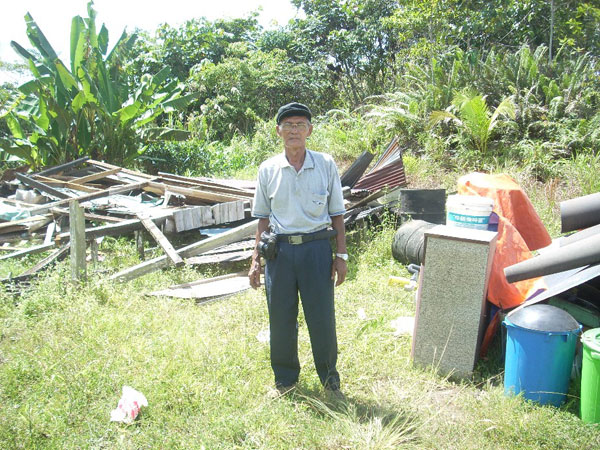
Picture 1: Headman Nor anak Nyawai of Sungai Sekabai in front of his destroyed house. Nor was the plaintiff of a 2001 landmark court case in which a Malaysian court acknowledged for the frist time acknowledged that native communities had native customary rights over primary rainforests.
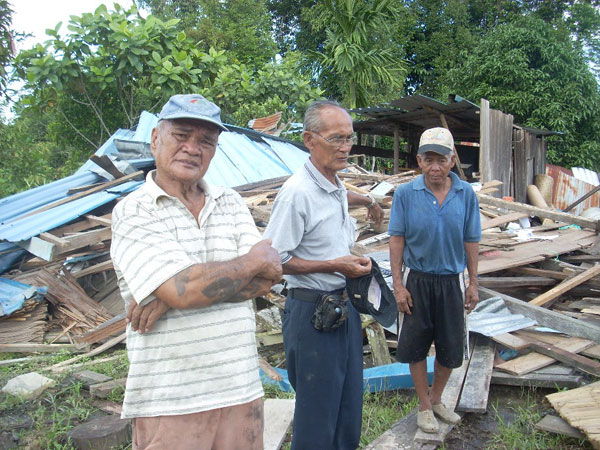
Picture 2: Iban natives of Sungai Sekabai are shocked after the destruction of their village by the Malaysian authorities; in the center headman Nor anak Nyaway.
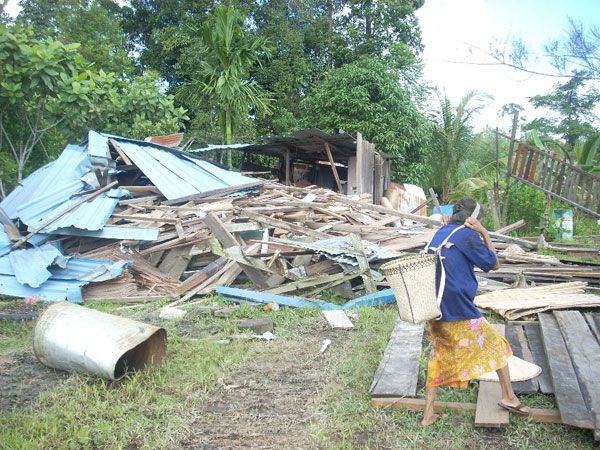
Picture 3: Destroyed house at the Iban village of Sungai Sekabai.
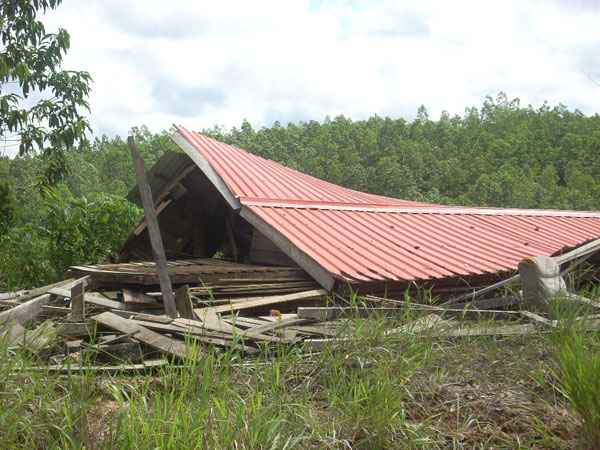
Picture 4: Destroyed house at the Iban village of Sungai Sekabai.
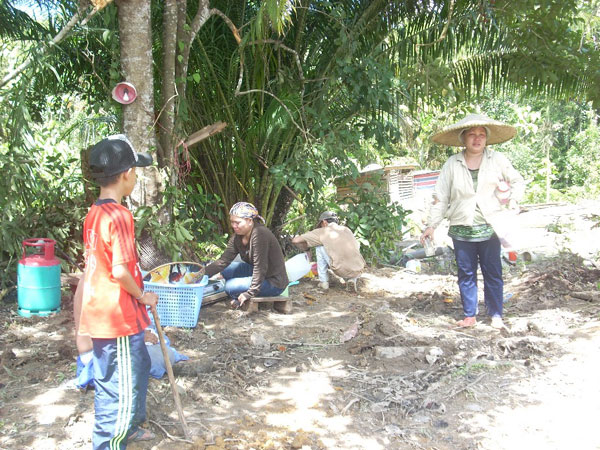
Picture 5: Iban villagers of Sungai Sekabai are gathering their belongings after their houses were demolished by a government team.
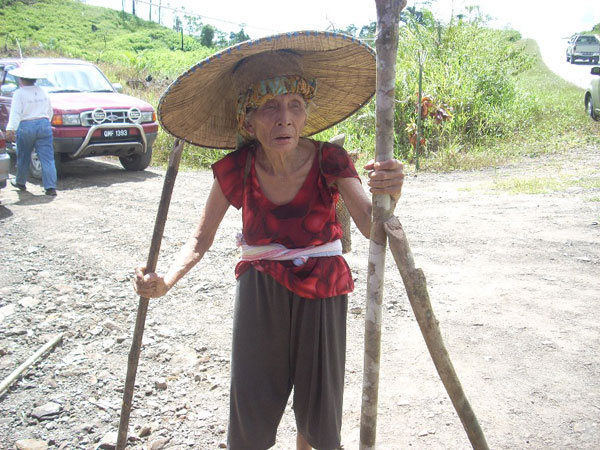
Picture 6: Rendered homeless by the Malaysian authorities: elderly Iban woman of Sungai Sekabai, Sarawak (Malaysia).
All photos courtesy of the Sarawak Indigenous Peoples’ network, TAHABAS.
Related articles
Malaysian police destroy homes in Borneo indigenous community
(01/20/2010) Malaysian authorities yesterday destroyed two dozen homes in an indigenous Iban community near the town of Bintulu in Sarawak, alleges a human rights group.
Malaysia and China agree to $11 billion deal to build mines, dams in Borneo
(01/13/2010) Malaysia and China today agreed to am $11 billion deal that will turn a vast area of Sarawak, a Malaysian state in northern Borneo, into an industrial corridor for mining and energy development, reports The Financial Times.

(12/22/2009) In James Cameron’s newest film Avatar an alien tribe on a distant planet fights to save their forest home from human invaders bent on mining the planet. The mining company has brought in ex-marines for ‘security’ and will stop at nothing, not even genocide, to secure profits for its shareholders. While Cameron’s film takes place on a planet sporting six-legged rhinos and massive flying lizards, the struggle between corporations and indigenous people is hardly science fiction.
Malaysia to allow logging in indigenous ‘peace park’ to proceed
(12/17/2009) Malaysia, the country with the fastest rate of greenhouse gas emissions growth since 1990 among middle and upper income countries, will allow logging to proceed in a contested rainforest area in Sarawak, on the island of Borneo.
Rainforest tribe sues the Malaysian government for enabling deforestation
(12/10/2009) Five Penan rainforest communities are suing the Sarawak state government and the Malaysian timber giant Samling for violation of their native customary rights, reports the Bruno Manser Fund, a group that works on behalf of indigenous groups in Malaysia.
Malaysian land minister attacks credibility of young indigenous rape victims
(12/07/2009) Speaking to the BBC, James Masing, Sarawak Minister for Land Development, dismissed claims by Penan girls and women who said they had been sexually abused and raped by logging workers in a remote jungle area.
Rainforest tribe declares ‘peace park’ to defend lands from logging in Sarawak
(11/30/2009) In an attempt to block destructive logging of their traditional land, a group of indigenous Penan has declared a “peace park” in the Upper Baram region of Sarawak in Malaysian Borneo, reports the Bruno Manser Fund.
Power, profit, and pollution: dams and the uncertain future of Sarawak
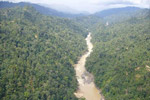
(09/03/2009) Sarawak, land of mystery, legend, and remote upriver tribes. Paradise of lush rainforest and colossal bat-filled caves. Home to unique and bizarre wildlife including flying lemurs, bearcats, orang-utans and rat-eating plants. Center of heavy industry and powerhouse of Southeast Asia. Come again? This jarring image could be the future of Sarawak, a Malaysian state on the island of Borneo, should government plans for a complex of massive hydroelectric dams comes to fruition. The plan, which calls for a network of 12 hydroelectric dams to be built across Sarawak’s rainforests by 2020, is proceeding despite strong opposition from Sarawak’s citizens, environmental groups, and indigenous human rights organizations. By 2037, as many as 51 dams could be constructed.